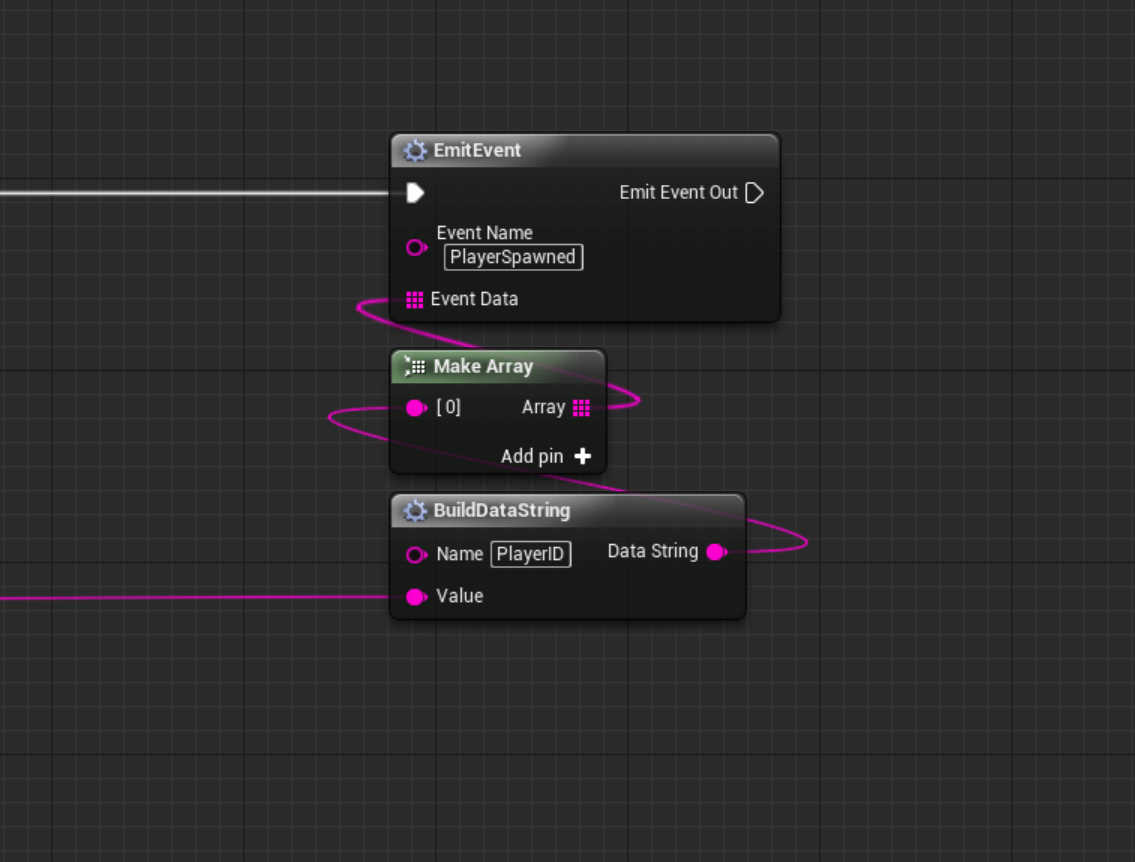A simple macro library to use in ARK modding projects that provides Observer Pattern-esque functionality. This is not a true Observer Pattern implementation, but uses many of the same concepts.
This provides a more robust way to pass data between actors in a mod. This even works between different mods, which is useful because the actors using it don't need to have references to anything they are passing the data to.
Observer Pattern: https://en.wikipedia.org/wiki/Observer_pattern
- Clone the repository to the ARK Dev Kit's
modsfolder, or download theARKObserverMacroLibrary.uassetfile and place it somewhere within the ARK Dev Kit'smodsfolder.
There are currently 10 macros made available by this library:
EmitEvent- emits an event that other actors can listen for. You need to specify an event name and any event data you wish to send.HandleEvent- takes input from theActorCustomEventnode (available in the ARK Dev Kit) and processes it, returning the event name and event data.GetData- takes the event data (previously processed byHandleEvent) and a key and returns the event data that corresponds to that key.BuildEventString- takes the event data and an event name and returns a string representing the event with its data. This happens automatically inEmitEvent, but I've made this method available in case you would like to get a raw event for some reason.BuildDataString- takes a name and a value corresponding to the data you want to send and creates a data string using the name and value. If you don't want to use this method, you can easily create the data string yourself by putting the delimiter:=:between the name and the value (e.g.PlayerName:=:MyPlayerName). The:=:delimiter is to reduce the possibility of data containing characters that could conflict with the observer. If you choose to create your data string manually, it is up to you to sanitize your data to make sure it doesn't include the following delimiters:#$#,:=:,!@!(used internally)SanitizeEventData- used internally inBuildDataString, this makes sure the data passed in is properly sanitized to not contain any of the internally used delimiters. It also trims whitespace.VectorFromString- used to convert a string into a vector. Only works with strings in the format returned from the vector string conversion node.RotationFromString- used to convert a string into a rotation. Only works with strings in the format returned from the rotation string conversion node.TransformFromString- used to convert a string into a transform. Only works with strings in the format returned from the transform string conversion node.BooleanFromString- used to convert a string into a boolean. Passing in the stringstrueor1will return the booleantrue, otherwise it returns the booleanfalse.
To emit an event, follow these steps (click here for an example):
- Prepare the data you wish to send.
- Find the
BuildDataStringmacro and provide a name for the data and the associated data you wish to send. - Repeat step 2 for all data you want to add to the event.
- Find the
EmitEventmacro and enter an event name directly into the appropriate input. - Drag off of the
Event Datainput on theEmitEventmacro and look for theMake Arraynode. - Drag off of the outputs of any
BuildDataStringmacros and connect them to the inputs of theMake Arraynode.
In this example, a PlayerSpawned event is emitted when a player is spawned containing the ID of the player, stored as PlayerID. Any actors that are set up to listen for it will receive the event and have access to the ID of the player.
To listen for an event, follow these steps (click here for an example):
- Get a reference to
GameModeand cast it toShooterGameMode. - Drag off of the cast to
ShooterGameModenode and look for theBind Event to OnActorCustomEventnode. - Drag off of the red method box on the event node and select the option to create a new custom event. Name it whatever you want.
- Drag off of the
Event Custom Stringoutput of the custom event node cast node and look for theHandleEventmacro. - Drag off of the
Event Nameoutput of theHandleEventmacro and use aSwitch on Stringnode to direct execution to different logic depending on the event name. - Connect the execution of the custom event node to the
Switch on Stringnode. - To get the event data corresponding to a specific key, use the
GetEventDatamacro and connect its input to theEvent Dataoutput of theHandleEventmacro. - Enter the key for the data you want into the
Keyinput of theGetEventDatamacro. - The
Valueoutput of theGetEventDatamacro will be the data you requested with the providedKeyvalue, assuming it exists in the event data.
On the actor that is listening for the PlayerSpawned event, we get the PlayerID data from the event data and print it.
- I recommend emitting events and listening for events on the server to avoid duplication. Handle it however you want to though.
- For some reason emitting events does not work from weapons. If you want to emit an event from a weapon, emit it from a buff on the player using the weapon instead. Emitting events from other types of primal items does work.

